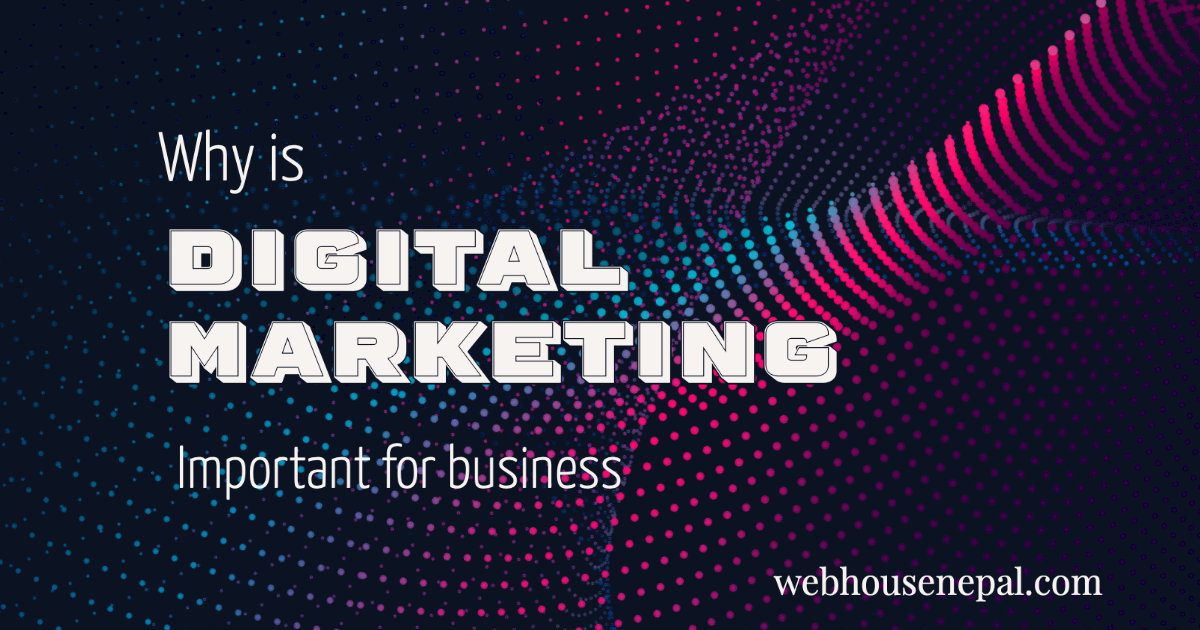Home / Blogs / Why is digital marketing important for business?

Marketing is often characterized as selling or promoting as most individuals are indecisive of its absolute essence. While not incorrect, these responses are merely aspects of marketing. There are numerous additional dimensions of marketing, such as supply chain management, branding, designing and ensuring quality service to refine the customer experience, market analysis, identifying market profiling, and much more.
In simple words; marketing can be defined as the perpetual promotion of a brand, product, or service via a multitude of platforms with an initiative to persuade a target audience. Ideal marketing can be one of the prominent factors determining the growth and success of any company.
Digital marketing has been regarded as a boon for many companies in the recent era of advanced technology, and it has been evident that online marketing strategies generate a significantly higher return on investment (ROI) than conventional marketing.
Digital marketing can be defined as the practice of promoting products and services to consumers through digital platforms. Incorporating websites, mobile devices, social media networks, search engines, digital communication, and other relevant virtual streams are all part of digital marketing. The global reach of the internet enables digital marketing to assist a company in connecting to a much broader audience than it could with conventional marketing strategies.
The domain of digital marketing is undeniably marked by intense competition. Yet if all the modules of digital marketing are used with the optimal strategy, it can lead to a successful formulation.
With many digital marketing alternatives, it might be overwhelming to decide where to concentrate effectively to connect and interact with potential clients and stand out in the market.
Cheer up; the web house Nepal presents you with the parts of digital marketing that enable your company to stand out in the saturated marketplace.
SEO is a series of techniques spawned to boost the exposure and visibility of web pages in organic search, with the intent of enhancing both the quality and quantity of online traffic flowing from search engines to a website or web page. The more prominent your pages are in search results, the more attention you will get and attract both potential and returning clients to your business.
Just as the term "pay-per-click" implies, it is a digital advertising approach in which the advertiser is charged a cost each time one of their adverts is clicked. A well-executed PPC advertising campaign enables an advertiser to make significant financial benefits, as each visit (click) from a potential client is worth more than the click cost paid to a publisher.
Affiliate marketing is the technique of receiving payment (commissions) each time affiliated third parties advertise a product or service of a business and generate revenue. Affiliate marketing has undeniably paid off, being extremely advantageous to both businesses and affiliate marketers as it significantly boosts online revenue and increases sales.
Brands can increase their online visibility by creating video content via video content marketing. When implemented effectively, video content can be a potent tool for companies seeking to reach a broad audience with their brand.
Digital marketing enables profoundly customised marketing, in contrast to conventional marketing strategies like TV or print advertising. Any size and type of company benefit from digital marketing since it generates access to the mass market at a minimal cost.
Also read Pros and Cons of Social Media Marketing
Companies can increase awareness by customising their brand voice and story on social media and digital platforms, whether by publishing interesting content or running advertisements.
It expands business reach
Digital marketing exposes your brand to every potential consumer, promptly expanding your brand and business reach, which simultaneously enhances your conversion rate and the calibre of your leads.
Can set target audience(customer)
With the ideal algorithm and myriad alternatives to choose your target audience by sorting them into various attributes such as gender, age, geography and niche digital marketing take your content and brand to the one that you target.
It is cost-effective.
Digital marketing enables you to spend a minimal budget while generating greater impact. Some parts of digital marketing, like SEO, content marketing, social media marketing, and email marketing, can be worth more than a company spends.
Easy to track and measure
Digital marketing enables you to precisely keep track of everything, including page views, organic traffic, engagement, revenue, leads, and conversions. You can also assess and evaluate whether your resources are being invested efficiently.
The security and privacy of consumer data and insights can be a real hurdle in digital marketing. It is usually advised to secure and protect network connections using firewalls and encryption solutions like VPNs.
Digital marketing is entirely reliant on technology, and there is always the probability of errors on the internet. There can be instances when sites buffer—landing pages don't load, links don't function, and page buttons just don't function—which prompts potential consumers to switch brands.
Every day, new brands are introduced, and these companies strive to keep up with the evolving expectations of consumers.
When small businesses first start out, attracting the first wave of customers is often their top priority. During their early phases, startups must overcome a wide range of challenges. Standing out as a brand and competing in the existing market can be a stumbling block.
To effectively reach larger audiences promptly and within budget, small businesses need to emphasise creating an online presence and plan digital marketing strategies. Small businesses may launch a digital marketing campaign, target as many specific groups as they can, and interact with customers at a reasonable price while simultaneously helping to build brand image.
Digital marketing can ultimately be a blessing if it is planned effectively and can assist a company in succeeding and building a strong brand.